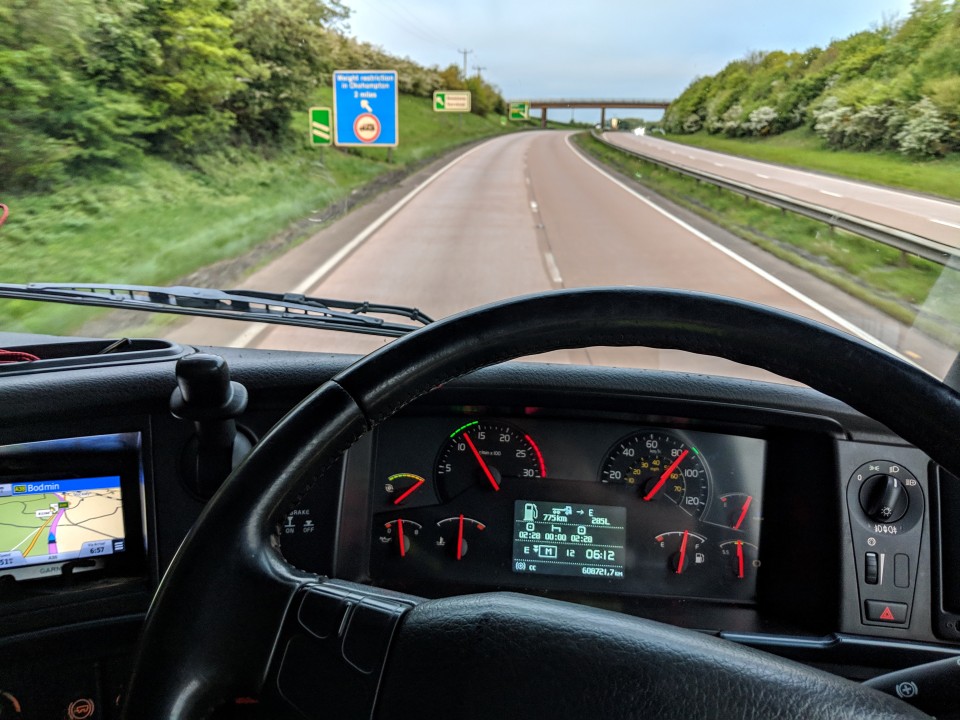
Susie Jones
Are you bored on the road?
Creat: 27.08.2024
•
Actualizat: 27.08.2024
The average truck driver spends roughly 12 hours behind the wheel every day. Endless time on the open road may sound appealing, however, the reality is a stark contrast. Countless petrol stations, rest areas, and long hours can become tedious. Truckers often spend their downtime away from home and preventing boredom can be challenging.
Convoy's recent survey suggested boredom was one of truckers’ top challenges. What effect is boredom having on driver well-being? And how can truckers stay entertained?
How boredom affects driver well-being
Fatigue, isolation, loneliness, and a lack of mental stimulation are common concerns for drivers. Some drivers may tackle these concerns with unhealthy coping mechanisms - such as overeating, smoking, or excessive caffeine consumption. Over time, these habits can negatively impact mental health.
However, as talk surrounding mental health improves, more and more drivers are taking a different route to combat this. We asked truck drivers on Facebook what they do when boredom kicks in.
“Audiobooks, mainly psychology. Music, chatting with loved ones, or listening to the radio. Or I turn everything off and have a peaceful existence with my own thoughts,” says Nigel.
Others have mentioned how talking with loved ones over the phone has helped. Ashleigh states:
“Talking to my friends in a group chat. Honestly, if I didn’t have them, I’d have quit a long time ago. The road throws up some rubbish and without talking to really good friends I’d never have survived.”
Likewise, Karl believes a “group chat with friends is a must.”

Preventing boredom behind the wheel
Contrary to popular belief, trucking is a physical endeavour - drivers need coordination and concentration to avoid accidents. Despite this, being behind the wheel for extended periods can cause fatigue. The risk of getting complacent on the job can occur, especially if a driver knows their route well. How can drivers deal with complacency behind the wheel?
Whether it’s listening to a podcast or a catchy tune, drivers must choose something that keeps their mind alert. We’ve compiled a list of things to prevent boredom behind the wheel.
• Podcasts: Truck driver Marty listens to “dozens of podcasts” whilst driving. Podcasts are an excellent way to change things up and learn something new. Check out this useful list of trucking podcasts
• Music: “Music, music, and music” is Richard’s boredom buster. Whether it’s listening to the radio or singing along to a playlist, music is an excellent way to keep the mind alert
• Take a break: Although drivers have strict deadlines and tachograph regulations, getting out of the cab when boredom kicks in helps the mind refocus.
Boredom during downtime
Truckers face additional challenges to entertain themselves after their shift. Taking a proactive approach to preventing boredom during this time is imperative. We’ve compiled a list of ways to pass the hours.
• Location: Truck stops that offer a vast range of facilities and a communal feel are an excellent way to alleviate boredom. Some act as a social hub where truckers can share similar experiences. Head over to our locations page to see what facilities our SNAP service partners offer
• Exercising: Taking a daily walk or getting creative with your workouts can prevent boredom and ensure you stay fit and healthy. Check out our tips for staying healthy on the road
• Streaming services: Catch up on the latest TV show or scroll through social media. Truck driver Steve likes to “scroll and comment on Facebook and watch Netflix” to pass the time
• Hobbies: The opportunities are endless. Learning an instrument, learning a foreign language, drawing, writing, and more. Picking up a hobby is an effective way to prevent boredom
• Cooking: Cooking meals in the cab has many benefits. Not only does it prevent boredom, but it saves money and is healthier
• Stay connected with loved ones: A trucker’s downtime provides the perfect opportunity to contact those closest to them. Video calls are an effective way to feel closer to family and friends
• Relax: Truckers can face stressful situations. Relaxing fully after a shift can improve driver well-being. Relaxation techniques such as deep breathing exercises and meditation reduce stress.
Although some drivers enjoy the solitude and independence the open road offers, combating boredom is still a challenge for many. Due to the nature of the job, truckers often experience long periods of boredom. However, to improve well-being, job satisfaction, and road safety, they must find ways to alleviate it. Whether it’s focusing on the task at hand, listening to the radio, or chatting with friends and family, most truckers can find a solution that works for them.

Where do lorry drivers sleep?
Most drivers sleep in their cabs since they are well-equipped for a comfortable night’s sleep. A basic sleeper cab includes a bed, storage, lights, and electrical outlets – making it a home away from home.
Due to the current European parking shortage, many drivers park in laybys. Doing so is deemed unsafe and leaves a driver vulnerable to theft. From November 2017, HGV drivers in the UK must take regular weekly rest breaks in proper rest areas (like service areas and truck stops).
SNAP’s Depot Parking scheme allows fleets to offer their truck parking spaces to the network, alleviating the shortage and helping drivers avoid vulnerable situations. In addition, SNAP provides over 450 service partners across Europe for drivers to park at. Head over to our maps page to learn more.
Why do truck drivers leave their trailer doors open?
If you’ve ever driven down a main road at night, you may have noticed trucks parked with their trailer doors open. A lot of drivers do this to deter thieves, the assumption being that if the trailer door is open there is nothing to steal. This is predominantly done on curtain-side trailers as it prevents thieves from slashing the curtain to see what’s inside.



